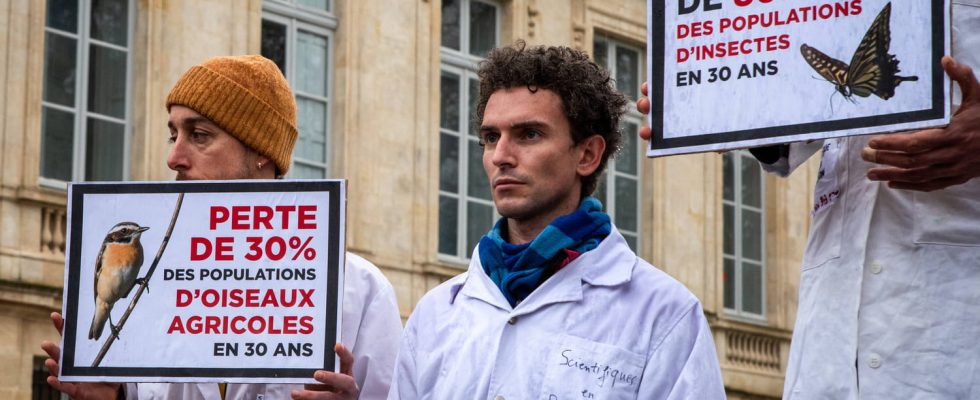The Ecophyto plan, which consists of reducing the use of pesticides, was put on hold following a government decision. If this was part of the farmers’ demands, environmentalists and NGOs are angry.
This Thursday, February 1, the government made new announcements, the third set of measures in just a week, in response to the farmers’ protests. Among them, the pausing of the Ecophyto plan, the aim of which is to reduce the use of pesticides. A choice which meets the expectations of farmers, but which outrages environmentalists.
As early as 2008, the agricultural union FNSEA showed its opposition to this plan, estimating in particular that the alternatives would be insufficient to ensure farmers’ yields at lower cost. The plan was notably rejected by producers of major crops such as cereals, sugar, etc. They believed that these constraints would prevent them from being competitive with countries where legislation is less strict.
What is the Ecophyto plan?
The Ecophyto plan was launched in a first version in 2008. Its objective: to reduce the use of pesticides by 50% within 10 years. The State then looked into the search for alternative methods. However, in 2018, this objective was far from being achieved and the deadline had to be pushed back to 2025.
In 2023, Elisabeth Borne, then Prime Minister, announced a new postponement with the “Ecophyto 2030” plan. This should include the proposal for alternative solutions for 75 molecules which risk being withdrawn from the market in the years to come. This project should also contain tools to support professionals in this use of alternatives to pesticides, in particular through training as well as through a network of pilot farms.
Relief among farmers
Since the start of the mobilization this January, the FNSEA has put the subject back on the table, expressly asking for this plan to be stopped as the first measures to be put in place. Marc Fesneau, Minister of Agriculture, announced a pause in this program, “time to rework a certain number of aspects”.
This announcement is rather well received by farmers, even if they remain cautious about what could be offered in return. Quentin Descombes, owner of a market garden, interviewed by Europe 1expressed his satisfaction after this decision, citing “crops such as green beans, endive, spinach which are subject to a withdrawal of active ingredients, while at 200 meters, we have Belgium which has the right”.
“This moratorium will surely allow us to give ourselves the vision. But we want concrete cases and quickly,” adds the farmer. Same relief for a salad producer interviewed at 8 p.m. France 2 since she uses a herbicide for her production and feared that it would be banned this year.
Environmentalists outraged
If some farmers seem to be in favor of this break, those who grow organic crops do not have the same opinion. On the side of environmentalists and NGOs, the same story. WWF notably described this announcement as a “disastrous signal” in the midst of a period of destruction of biodiversity. For its part, Générations futures pointed out a “major setback which takes us back 15 years” on X.
Marine Tondelier, National Secretary of Europe Ecology Les Verts, also reacted by deploring that the government is not tackling “the real problems”.
So yes, the government can decide to no longer protect water, land, biodiversity and even our health.
But with that our farmers will not earn more (their main demand).
In truth, in the end, everyone will lose.#AngryFarmers
— Marine Tondelier (@marinetondelier) February 1, 2024
Part of the left also takes this point of view. “It’s total madness on an ecological level,” denounced Clémentine Autain, LFI deputy for Seine-Saint-Denis, on the plateau of FranceInfo. Opponents also fear for the health of farmers, as pesticides can cause serious pathologies.
A truly legal decision?
Can the government really put the Ecophyto plan on hold? This measure raises questions from a legal point of view. Indeed, France has already been called to order for non-compliance with its objectives on previous Ecophyto plans. In June 2023, the Administrative Court of Paris even ordered the government to respect its trajectories for reducing the use of pesticides by June 2024. It therefore seems complicated to put in place “a pause” a few months before the end of the year. due date.
According to Dorian Guinard, teacher-researcher, who spoke on X, “pausing a court decision is not possible”. A law would therefore be necessary to modify this constraint. Bernard Jommier, socialist senator, also wanted to recall that “the protection of biodiversity is included in the environmental charter which has constitutional value” as reported Public Senate.
